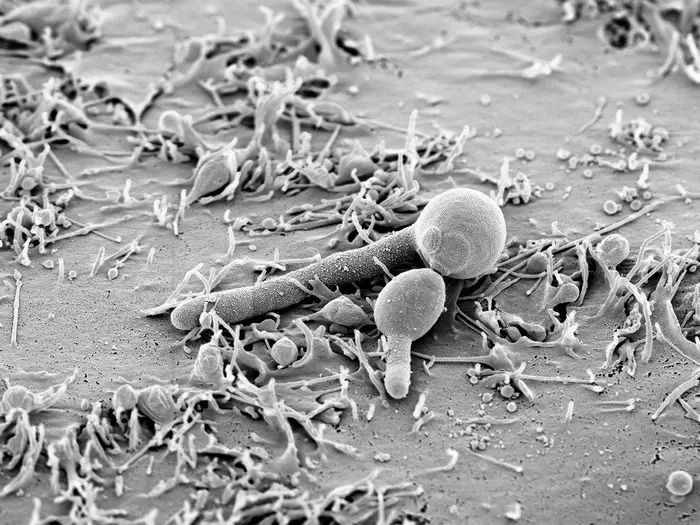The fungus Candida albicans commonly inhabits the human gastrointestinal tract. This versatile species can switch between existing as single-celled yeast and multicellular hyphae to adjust to its surroundings. The conventional belief regarding C. albicans commensalism is that the yeast form is best suited for gut colonization, while hyphal cells are seen as hindering colonization but essential for virulence.
 Candida albicans in the yeast and hyphae form on human epithelial cells. Image Credit: Gudrun Holland, Muhsin Özel, Katherina Zakikhany and Bernhard Hube / Leibniz-HKI
Candida albicans in the yeast and hyphae form on human epithelial cells. Image Credit: Gudrun Holland, Muhsin Özel, Katherina Zakikhany and Bernhard Hube / Leibniz-HKI
However, the current study demonstrates that this principle does not hold true for multi-kingdom communities, where the interaction between fungal morphology and bacteria plays a crucial role in determining C. albicans fitness.
In our study, we focused on Candida albicans and the importance of its toxin Candidalysin. The fungus is a natural part of the human microbiome and coexists with numerous other microorganisms such as bacteria in our gastrointestinal tract.”
Richard Bennett, Professor, Brown University
Two distinct growth forms - a round yeast form and an elongated hyphae form - are produced by C. albicans during multiplication.
Previous studies in mice indicated that the yeast form is advantageous for colonization of the intestine. The fungus develops its pathogenic effect primarily in the hyphal form. This form secretes Candidalysin and thus damages host cells. If C. albicans exists primarily as a colonizer of the intestine, i.e. as a round yeast form, why are almost all isolates of the fungus able to form hyphae? What selection pressure ensures that the fungi do not lose the ability to form hyphae?”
Bernhard Hube, Department Head and Professor, Leibniz-HKI
Bernhard Hube is also a Professor at Friedrich Schiller University.
The idea that the yeast form is more suitable for colonization needs to be reexamined, as evidenced by comparative studies conducted on mice with a complete microbiome and a microbiome that has been diminished due to antibiotic use. Candida albicans effectively colonizes the intestine by using both the yeast and hyphae forms as soon as a complex bacterial community is present. However, why do the hyphae form better in the presence of bacteria?
Hube added, “Only in the hyphal form does the fungus produce the toxin Candidalysin, which has an antibacterial effect. This enables the hyphae form to compete with bacteria in the gastrointestinal tract. The toxin inhibits the metabolism and thus the multiplication of the bacteria. This gives the fungus a competitive advantage. The release of Candidalysin associated with the formation of hyphae therefore probably contributes to the fact that the fungus is such a successful colonizer of humans. This may explain why the hyphal form of C. albicans is also so important during colonization of the intestine.”
The fungus’s ability to colonize the intestine is also decreased if hyphae formation is inhibited.
Hube concluded, “The fungus has therefore not developed the toxin primarily to damage human cells, but to be able to compete with bacteria on mucous membranes, summarizing the key message of the study. The researchers want to investigate the interaction between fungi and bacteria and their effects on the host in more detail. The Cluster of Excellence ‘Balance of the Microverse’ at Friedrich Schiller University Jena, with its focus on microbial interactions, offers us an ideal environment for this.”
Source:
Journal reference:
Liang, S., et al. (2024) The hyphal-specific toxin candidalysin promotes fungal gut commensalism. Nature. doi.org/10.1038/s41586-024-07142-4